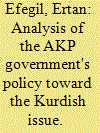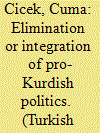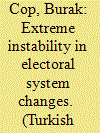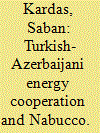|
|
|
Sort Order |
|
|
|
Items / Page
|
|
|
|
|
|
|
| Srl | Item |
| 1 |
ID:
105388


|
|
|
|
|
| Publication |
2011.
|
| Summary/Abstract |
The Kurdish issue emerged as a result of the Kemalist modernization policy. For many years Kurds and other groups were forced to absorb Turkish values and culture instead of developing their own local identities. For this reason, Kurdish uprisings occurred. By describing these uprisings as ethnic separatist movements, the government authorities instituted military measures against Kurdish groups in order to suppress their demands. But, for the first time in 1992 former President Turgut Özal accepted the reality of the Kurdish issue rather than describing it as an ethnic separatist movement. Accordingly, he suggested taking social, political and cultural measures as supplements to military operations. Özal's approach has been seriously taken up by the AKP government. As opposed to traditional policy, the existing government has noted that the problem emerged from violation of democratic rights of Kurdish people by state authorities and advocated that serious measures be taken to improve the socio-economic conditions in Southeastern Anatolia. The AKP government took considerable steps to improve democratic conditions in Turkey despite the PKK attack on the Dag(l?ca gendarme station on October 21, 2007. Permission to freely use the Kurdish language and changing the names of some towns back to original Kurdish were some of the results. But the military elites, the opposition parties - the CHP and the MHP - and the Kurdish-originated PDP party opposed the government's policy. Still, in order to find a peaceful solution to the question, the government has to make fundamental constitutional amendments in order to improve conditions and guarantee the rights of Kurdish people. In the meantime, it has to take serious steps to improve socio-economic conditions in the region as well as disarm the PKK terrorists.
|
|
|
|
|
|
|
|
|
|
|
|
|
|
|
|
| 2 |
ID:
105387


|
|
|
|
|
| Publication |
2011.
|
| Summary/Abstract |
The new geopolitical conditions and the regional seeking of neoliberal, pro-Islamist politics facilitate the ending of the Kurdish conflict in Turkey and to rebuild political relation with the Iraqi Kurds. Besides, the rise of pro-Kurdish politics both within Turkey and Iraq has nearly closed the door on the sustainability of the traditional security policy. However, the AKP's Turkish nationalist ideological-political character, the lack of the deep democratic values in the political tradition of neoliberal pro-Islamic politics and its weak administrative capacity about the Kurdish issue have prevented it from going beyond the traditional national security policy to solve the Kurdish issue and to disarm the PKK.
|
|
|
|
|
|
|
|
|
|
|
|
|
|
|
|
| 3 |
ID:
105386


|
|
|
|
|
| Publication |
2011.
|
| Summary/Abstract |
This article examines the extremely volatile character of electoral system changes that took place in Turkey from the end of the Second World War up until the end of the 1990s. Motives that drove these changes were either related to intentions to prevent the undesirable repetition of the past circumstances, or to political actors' short-term goals. Some of these changes seem to have reached their objectives while some others have not. The volatility in electoral institutions' design was also strongly associated with the fluctuations Turkey experienced in terms of democratic consolidation. In this respect, the Turkish case may offer a variety of useful empirical material for the prospective designers of new institutions in a number of former communist countries that are likely to experience further stages of democratic transition/consolidation in the years ahead.
|
|
|
|
|
|
|
|
|
|
|
|
|
|
|
|
| 4 |
ID:
105392


|
|
|
|
|
| Publication |
2011.
|
| Summary/Abstract |
This study analyzes the conditions agriculture students in Turkey are provided with in terms of housing resources, research funding and family background to determine how comparable the Turkish college youth is with their counterparts in Europe. The research made shows that students coming from working class or agriculturist families can only attend college if they receive governmental scholarship and/or hold a job while studying. The comparison between the genders shows that the fathers of most of the female college students have a better educational and professional background and, thus, come from households that have a higher net income than those of the male students on average. However, upon graduation, women have a higher tendency to suffer from unemployment.
|
|
|
|
|
|
|
|
|
|
|
|
|
|
|
|
| 5 |
ID:
105396


|
|
|
| 6 |
ID:
105389


|
|
|
|
|
| Publication |
2011.
|
| Summary/Abstract |
A panoramic outlook on the present global system shows that the US has been failing to preserve its global preponderance against the rise of new contenders from Asia. Turkey's new foreign policy demeanor under the AKP government reflects this shift of global power from the West to the East, leaning on both of these two poles (especially Russia and the US), thereby, aims at creating a 'zero-problem' situation with the neighboring Caucasian states. Yet, this strategy has not achieved its goal, mainly due to the ongoing debates, not only between Moscow and Washington, but also between Azerbaijan and Armenia in the Caucasian Regional Security Complexity. This work tries to read all these developments by applying insights from the neoclassical realist standing and argues that there are two main hindrances to the plan's success: the dynamics of the current global system and the security complexity of the Caucasus region.
|
|
|
|
|
|
|
|
|
|
|
|
|
|
|
|
| 7 |
ID:
105391


|
|
|
|
|
| Publication |
2011.
|
| Summary/Abstract |
Between 1953 and 1974, the main actors in the "Cyprus Dispute" resorted to weapons in order to pursue interests or defend their rights. Way into the second half of the 1990s, the international community maintained a fear that a war might resume between the two communities that could ultimately engulf both sides of the Aegean. However, from the 1990s onwards the battle of weapons has been eclipsed by a battle of books. Losing faith in military means to force Turkey's troops out of Cyprus, the Greek side began placing more emphasis on international law in order to pinpoint to Turkey's elite the economic and political costs of maintaining the status quo. As will be demonstrated, the property issue may turn out to be the Turkish side's Achilles heel.
|
|
|
|
|
|
|
|
|
|
|
|
|
|
|
|
| 8 |
ID:
105395


|
|
|
|
|
| Publication |
2011.
|
| Summary/Abstract |
This article investigates the relation between socioeconomic development and democratization in contemporary Turkey with reference to modernization theory. Based on studies showing that there is a positive correlation between socioeconomic modernization and democratization, it is argued that the relatively increased level of socioeconomic modernization in contemporary Turkey has created a more conducive environment for further democratization and democratic consolidation. In this regard, Turkey's GDP per capita, income distribution (Gini coefficient), level of industrialization and urbanization, educational attainment, and human development index (HDI) are analyzed in terms of their influence on democratization. Taking into account Turkey's increased level of socioeconomic development, EU-based reforms, and recent Freedom House ratings, it is argued that Turkey could be getting closer to democratic consolidation.
|
|
|
|
|
|
|
|
|
|
|
|
|
|
|
|
| 9 |
ID:
105394


|
|
|
|
|
| Publication |
2011.
|
| Summary/Abstract |
In a social environment where Turkish guest workers have been depicted as isolated, incapable victims who could not speak for themselves or for their people, German directors were the first to provide portrayals of immigrants in Germany. Then emerged the second generation of Turkish filmmakers who brought along a breakthrough for Turkish-German cinema. These filmmakers wanted to move beyond the cinema of duty and enjoy their double occupancy by interpreting their in-betweenness as cultural richness. The third generation filmmakers are now no longer the silenced and disadvantaged members of the host society; instead, they have been active agents who are qualified, skilled, educated and thus self-confident.
|
|
|
|
|
|
|
|
|
|
|
|
|
|
|
|
| 10 |
ID:
105393


|
|
|
|
|
| Publication |
2011.
|
| Summary/Abstract |
Is a democratization and globalization process in conformity with the state's founding principles possible for Turkey? This question undoubtedly has become one of crucial questions in the last decade due to Turkey's problems in overcoming difficulties related to globalization, accession to the European Union, the Kurdish question, civil-military relations and the secularism-Islamism clash. These problems became apparent and much stronger after the collapse of the coalition government headed by Prime Minister Bülent Ecevit and the takeover of the Islamist-originated Justice and Development Party (AKP) in 2002. I.smail Cem, a distinguished Turkish social democratic theoretician, journalist and politician who was one of the most important members of the collapsed coalition government as the Foreign Minister of Turkey, with his unique approach to Turkish modernity and political system as well as his moderate propositions for Turkey's democratic problems deserves to be remembered as Turkey is further challenged by these problems.
|
|
|
|
|
|
|
|
|
|
|
|
|
|
|
|
| 11 |
ID:
105390


|
|
|
|
|
| Publication |
2011.
|
| Summary/Abstract |
This article examines the prospects of the Turkish government's rhetoric of following zero-problems with neighbors and pursuing 'positive-sum' strategies to foster regional cooperation. Through a detailed examination of the Turkish-Azerbaijani energy cooperation in the context of the Nabucco natural gas pipeline, the article concludes that this policy is unsustainable and Turkey will come under pressure to set a more realistic foreign policy agenda that prioritizes among the country's strategic relationships. Moreover, although many believe that Turkey's overtures to Armenia lie at the heart of the troubles in Turkish-Azerbaijani energy talks, this article suggests that the real causes are the diverging interests between the two countries due to the underlying incompatibilities of their energy policies, breeding a 'negative-sum' game.
|
|
|
|
|
|
|
|
|
|
|
|
|
|
|
|
|
|
|
|
|